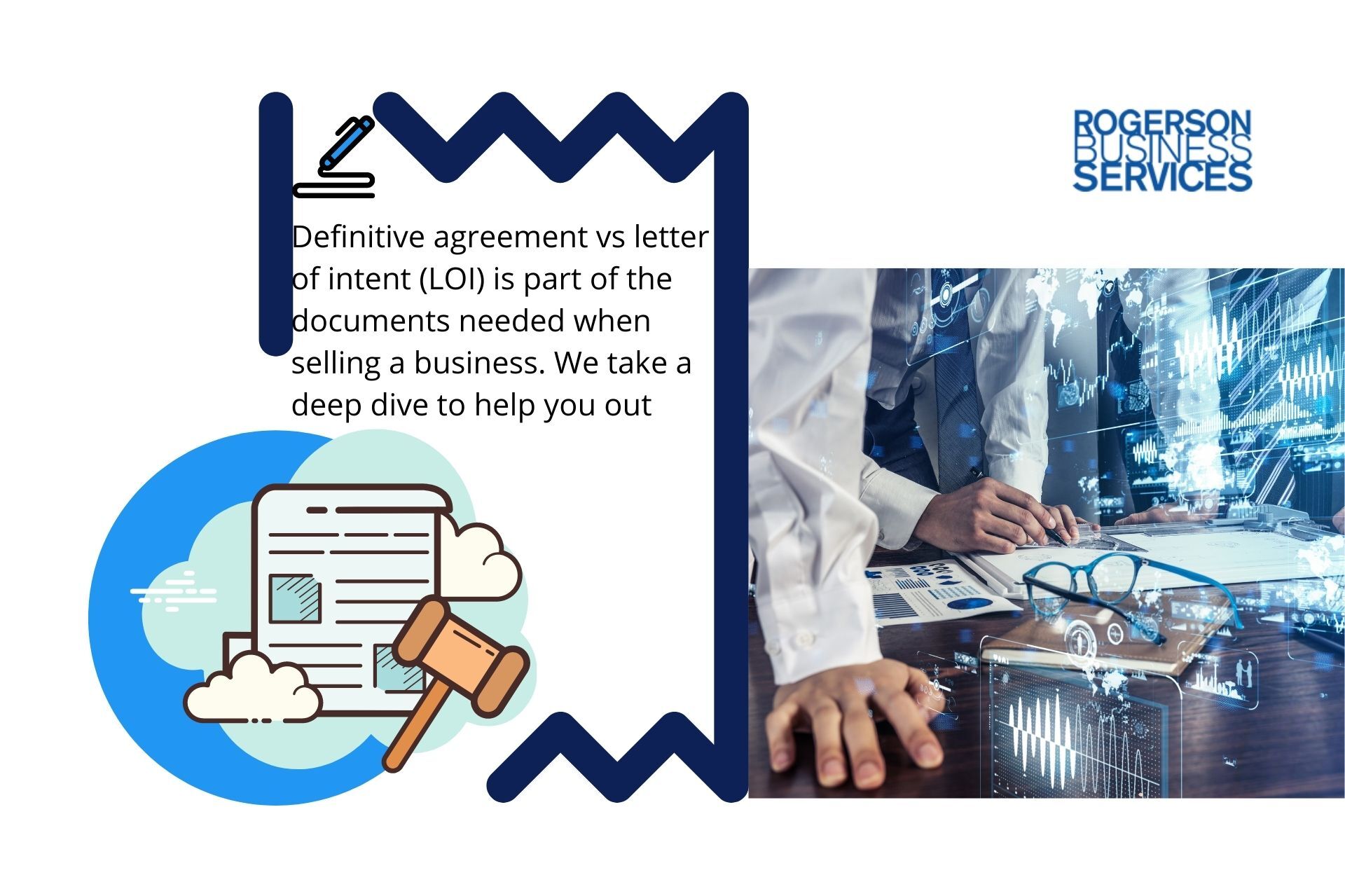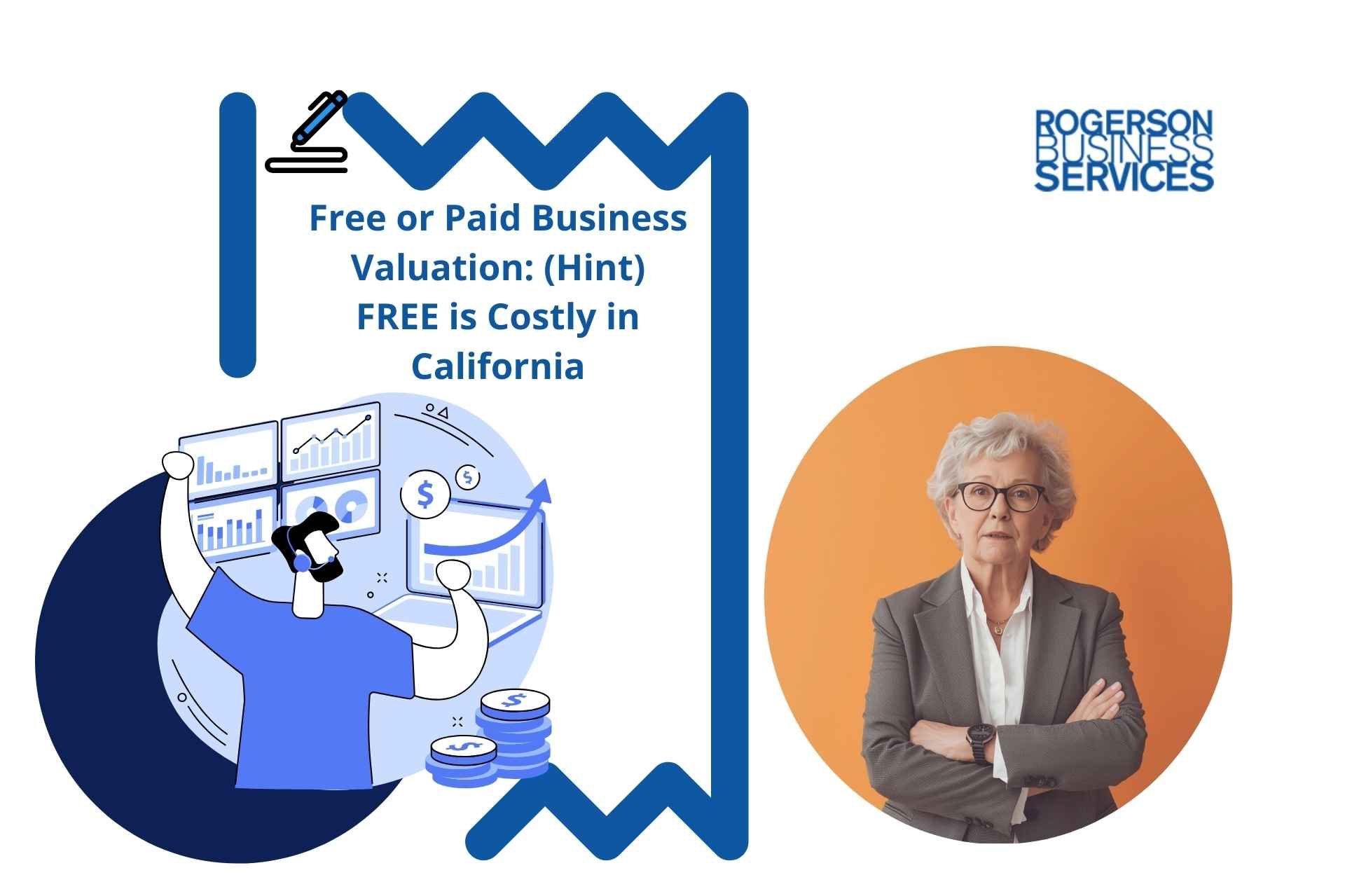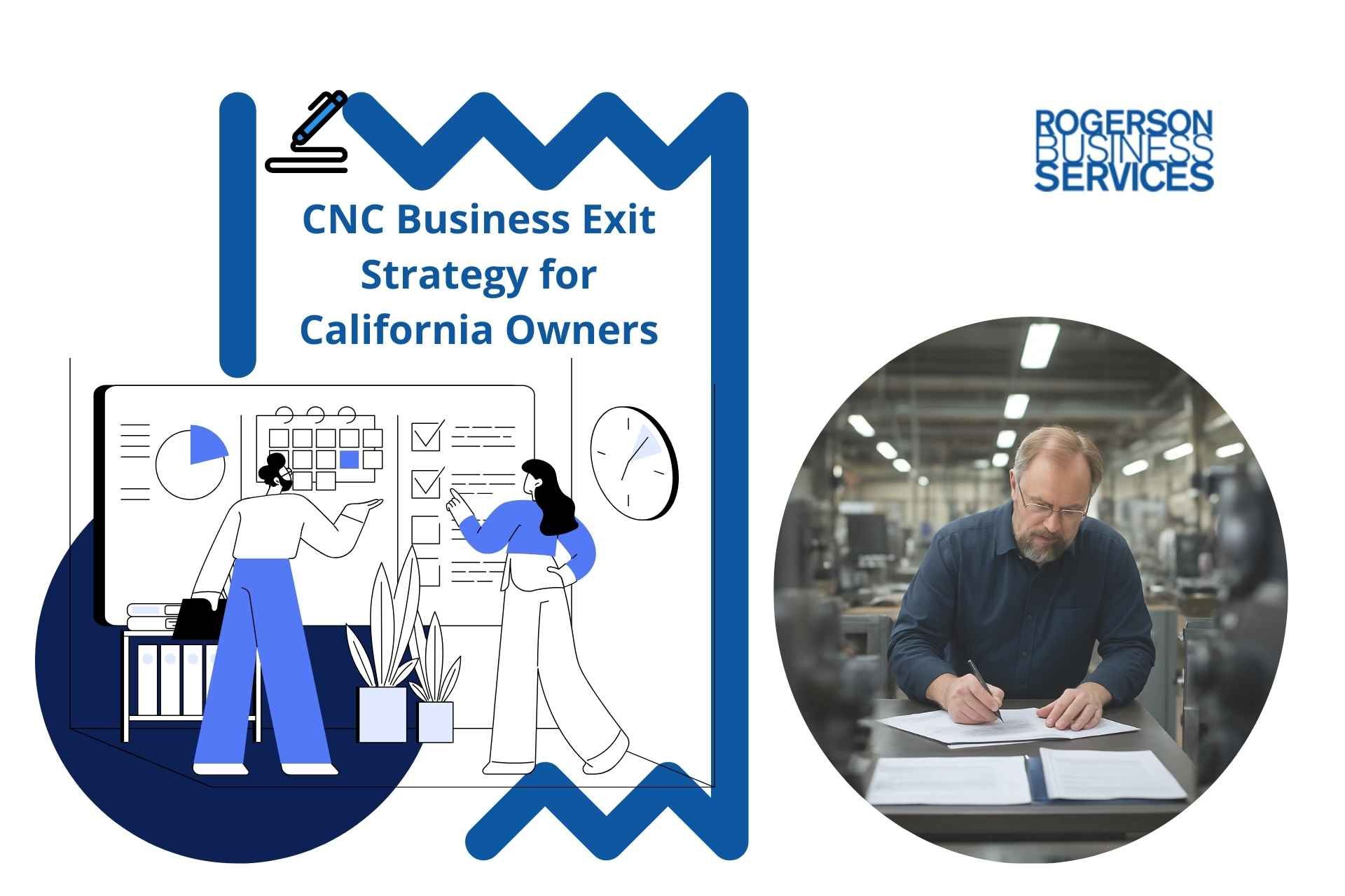A Quick Guide to Definitive Agreement vs. Letter of Intent (LOI)
Definitive Agreement vs Letter of Intent
If you're selling your business in California, there are legal documents and terms you should know. Here's a quick guide to help better your understanding of a Definitive Purchase Agreement and the Letter of Intent (LOI) concerning the merger and acquisition (M&A) process.

What Is The Letter of Intent (LOI)
The Letter of Intent or LOI is a document that shows the commitment both parties have to make a deal potentially. It's important to note that the LOI shows the commitment, but it doesn't mean both parties will commit to the agreement.
The LOI is an opportunity for all parties within the deal to work out the finer details of the M&A process. Consider the LOI as the stepping stone to the definitive purchase agreement.
Why Is The Letter of Intent Important?
The LOI is an important key to the entire M&A process. The importance of the LOI comes from the foundation it sets for a deal. Before any final agreement, details are hashed out and revised through the LOI.
During this early state process, due diligence plays a strong role in negotiating prices and terms. Important details such as closing dates, price, and parties involved are present within the LOI. Nothing within the LOI is final, but you should take everything seriously.
Types of Letters of Intent
While there are different LOIs, they all have the same goal: to show interest in purchasing something from another company or entity. Here are examples of other LOIs.
- Letter of intent to sell a business
- Letter of intent to purchase business
- Letter of intent to purchase assets
- Letter of intent to purchase real estate
- Business letter of intent
Due Diligence Checklist for Selling a Business
The Letter of Intent allows businesses to do their due diligence in their legal, financial, and research responsibilities. To simplify it, here's a seller due diligence checklist that will help you during the due diligence processes of selling a business.
- Team organization
- Get your business evaluated
- Gather your financial and tax-related documents
- Prepare your legal and financial liabilities
- Document all your intellectual property
- Create a roadmap for your operation
- Have a well-defined org chart
- Prepare HR and marketing information
Due Diligence Timeline
The timeline will vary depending on the purpose, but for the M&A process, you'll use most of the due diligence process as a confirmation check on all known facts. You may have some issues if you discover new information during the due diligence problem.
Your timeline as a buyer will vary depending on how thorough your due diligence process becomes. It can be a simple examination, or you can go into every detail of the business you want to purchase. Regardless, your timeline will be roughly a few weeks to a few months.
As a buyer, you want to get the best deal possible. Ensure that an attorney or an experienced professional helps you during the due diligence process. Here's what your checklist as a buyer will look like during the due diligence process.
- You want the most recent financial reports within the last four years of operation.
- Condition of tangible assets
- Examination of equipment and intellectual property
- All patents, domestic and foreign
- Marketing reports, top customers, and top sales risks
- Organizational concerns with employees and management
- Pending litigations
- Security measures
- Insurance and antitrust issues
- Environmental concerns
- Competitor analysis
What Is The Definitive Agreement
The Definitive Agreement, also known as the Definitive Purchase Agreement, is the document that finalizes all aspects of the merger or asset purchasing agreement. This document typically comes near the final stage of the M&A process.
Why Is The Definitive Agreement Important?
The Definitive Agreement is important because it's the final stage of the deal. Everything within the agreement is final and legally binding.
Another important note is that everything previously discussed in other documents, such as the LOI, no longer applies unless stated in the agreement.
Types of Definitive Agreements
There are two well-known definitive agreements. The first definitive agreement is the Stock Purchase Agreement, and the second is the Asset Purchase Agreement. Both are final statements that lead to the merger of a company or assets.
Stock Purchase Agreement
The Stock, or Share Purchase Agreement, is when a company agrees to purchase the majority share of a company. The party that purchases the shares acquires the company's assets, stocks, and liabilities.
Asset Purchase Agreement
An Asset Purchase Agreement differs in a few ways. First, one party is intent on purchasing the assets of the other. Within the agreement, assets such as machinery, equipment, employees, real estate, and even intellectual property can be up for grabs for the purchasing party.
What Is The Term Sheet
The Term Sheet's main purpose is to be a key to legal terms and conditions in all legally binding documents within the M&A transaction. The term sheet is important because both parties must understand the concepts and writing of the document, or there could be legal problems.
The important part of the term sheet is the outline of the price and overall structure of the deal. The Term Sheet is important because it preludes the LOI and purchase agreement. Before both companies commit, the term sheet will lay out the deal's viability.
How Does The M&A Term Sheet Differ From The Definitive Agreement?
The Definitive Purchase Agreement contains all aspects of the deal and is the final document to outline the finer points of the entire merger or asset purchase. The Term Sheet acts as a key to the agreement, but not as the end all be all legally binding document.
Letter of Intent vs. Purchase Agreement
The Letter of Intent differs plenty from the Definitive Purchase Agreement. First, not all aspects of the LOI are legally binding, but the entire Purchase Agreement is almost always legally binding. The Purchase Agreement is the most important document, while the LOI is the prototype document.
Both documents are extremely important to the M&A process, but only one will ensure that the deal goes through and that both parties follow all terms within the documents.
What Does LOI Mean In Real Estate
When it comes to real estate, LOI follows most of the principles of the M&A process. The only difference is who drafts the LOI and its purpose. Both parties will show interest and negotiate when a business or a person is trying to purchase a piece of real estate.
Negotiations will start with the real estate property's pricing, condition, and potential profits. The LOI terms will vary, but the due diligence timeline will look the same for most people. You may discuss lease terms and tenant prices if you're leasing the property.
Frequently Asked Questions
People have plenty of questions about LOIs and purchase agreements, so here are some answers to people's most common questions about them.
How serious is a Letter of Intent?
The Letter of Intent should be taken extremely seriously by both parties. The LOI shows that both parties are willing to commit to a deal, as the name implies. After creating a Term Sheet to outline the deal, the Letter of Intent is typically the next step taken.
Because most of the LOI isn't legally binding, other than confidentiality and exclusivity, inexperienced entrepreneurs don't take it as seriously as the Purchase Agreement. Large companies take it extremely seriously because of the money and time commitment.
Do you need a Letter of Intent?
You need some form of written intent to purchase a business or assets. Every business needs to document its interest and outline a deal before committing to something that will cost them time and money.
The LOI shows that both parties are willing to invest their resources into making a deal happen. That's why having an LOI is extremely important, even if it's not a legally binding obligation.
How long is a Letter of Intent?
LOIs aren't long documents, and they shouldn't be excessive lengths. The LOI is a document that outlines general information and the interest of the deal. Your Letter of Interest should be no longer than two or three pages. The shorter, the better, but don't leave out anything important.
Is the Definitive Agreement legally binding?
The Definitive Agreement is a mutually binding legal document that both parties must uphold. If any party is to break the contract, they will be responsible for damages, legal fees, and any other consequences within the Definitive Agreement.
What is financial due diligence?
The due diligence process protects your company from potential losses and liabilities. Financial due diligence focuses its efforts on the financial side of the due diligence processes. Companies will take a keen interest in asset value, profitability, and liabilities such as debt and receivables.
Conclusion
The steps you must take to sell a business can be complex, but doing your research will help ease the stress of it. If you need to sell your business in 2023 successfully, consider hiring an experienced professional to help you with the sell-side M&A process.
Selling Your Lower Middle Market Business Now or Not Ready
If you are a retiring business owner looking to exit your lower middle market business in California, here are five tips to get you started:
1. Don't wait until the last minute to start planning your exit. The process of selling a lower middle market business can take a long time, so it's important to start early.
2. Have a clear idea of what you want to get out of the sale. Know your goals and what you're willing to negotiate.
3. Choose the right type of buyer. Not all buyers are created equal, so do your research and find the right one for your business.
4. Be prepared for a lot of due diligence. M&A buy-side due diligence is when buyers will want to know everything about your business, so be ready to provide documentation and answer questions.
5. Be flexible with the terms and conditions of the deal. It's important to be open to negotiation to get the best possible deal for your business.
Rogerson Business Services, also known as, California's lower middle market business broker is a sell-side M&A advisory firm that has closed hundreds of lower middle-market deals in California. We are dedicated to helping our clients maximize value and achieve their desired outcomes.
We have a deep understanding of the Californian market and an extensive network of buyers, which allows us to get the best possible price for our clients. We also provide comprehensive support throughout the entire process, from initial valuation to post-closing integration.
Our hands-on approach and commitment to our client's success set us apart from other firms in the industry. If you consider selling your lower middle market business, we would be honored to help you navigate the process and realize your goals.
If you have decided to value and then sell your lower middle market business or still not ready, get started here, or call toll-free
1-844-414-9600 and leave a voice message with your question and get it answered within 24 hours. The deal team is spearheaded by Andrew Rogerson, Certified M&A Advisor, he will personally review and understand your pain point/s and prioritize your inquiry with Rogerson Business Services, RBS Advisors
This is part of hiring an M&A deal team tips to answer some FAQs about the deal structure & transaction series ->
Hey there! Can we send you a gift?
We just wanted to say hi and thanks for stopping by our little corner of the web. :) we'd love to offer you a cup of coffee/tea, but, alas, this is the Internet.
However, we think you'll love our email newsletter about building value and properly position your company before transition/exit your business ownership.
As a special welcome gift for subscribing, you'll also get our helping and educational guides, tips, tutorials, etc.. for free.
It's filled with the best practices for retiring serial business owners like Dan Gilbert, Larry Ellison, Warren Buffett, and many more.
Just sign up for our emails below.


